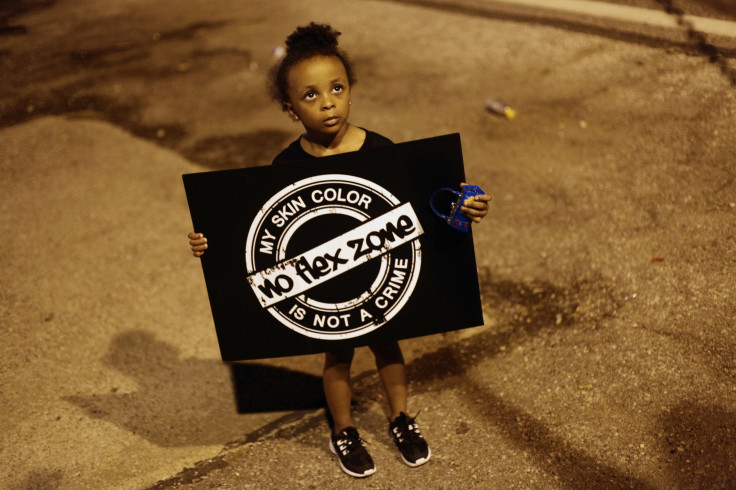Philando Castile Shooting: How Do Parents Talk To Children About Police Brutality?

Before he was a trending hashtag, before he was the subject of protests and before he was fatally shot by police Wednesday night, Philando Castile was a cafeteria supervisor at a local school in Saint Paul, Minnesota. The 32-year-old black man worked for the J. J. Hill Montessori Magnet School, coordinating meals for about 400 young students who will soon have to learn of his death.
Parents, teachers and administrators in Minnesota and across the country have wrestled with a depressing challenge in recent months as they try to figure out how to talk to children about police brutality. It's a tricky situation: How do you explain racism to a kid, especially when the accusations involve authority figures?
“Young people do not understand why all of this is happening,” Jonathan Newton, president of the National Association Against Police Brutality, said on a radio show in 2015. "The impact is really affecting our youth. We need to prepare our children for these circumstances."
Castile's death is not — unfortunately — the first, so there is guidance out there. Here are three approaches to keeping your child calm and informed:
Time it right.
Laura Markham, who founded Aha! Parenting and also trained in clinical psychology, wrote that age should determine how in-depth your conversation is with your child.
In general, she said, toddlers and preschoolers shouldn't be around adults' conversations about intense news events like Wednesday's. You should tell kids between 6 and 9 the basic facts of a police shooting and answer their questions as you see fit, emphasizing that guns can be dangerous and children should obey police. With older kids, facilitate discussions about the judicial system, racism and respect.
Be prepared to revisit the topic later and tailor your discussions based on your child's individual experiences.
"How do you explain to little black, brown and yellow boys that not all police officers are bad?" Yesha Callahan wrote for Clutch in 2012. "I tried to explain to my son that there are officers out there who genuinely take on that career choice because they want to serve their community, but that there are also some out there who abuse the privileges that are given to them, and because you’re never able to tell which one you’re dealing with, that it’s always best to respect the fact that they are 'authority' figures."
Seek resources.
You don't have to go it alone. Markham recommended checking out this 2011 TEDx Talk on "How I Learned to Stop Worrying and Love Discussing Race" with your child. Take cues from this spring episode of "Blackish." Read how some parents of color have spoken to their children about race.
After Michael Brown was fatally shot in Ferguson, Missouri, in 2011, social media users put together a Ferguson syllabus to help students learn about the shooting and subsequent protests. You can see posts in the hashtag here.
Or pick up a copy of "All American Boys," a young adult book with the following summary:
A bag of chips. That’s all sixteen-year-old Rashad is looking for at the corner bodega. What he finds instead is a fist-happy cop, Paul Galluzzo, who mistakes Rashad for a shoplifter, mistakes Rashad’s pleadings that he’s stolen nothing for belligerence, mistakes Rashad’s resistance to leave the bodega as resisting arrest, mistakes Rashad’s every flinch at every punch the cop throws as further resistance and refusal to stay still as ordered. But how can you stay still when someone is pounding your face into the concrete pavement?
There were witnesses: Quinn Collins—a varsity basketball player and Rashad’s classmate who has been raised by Paul since his own father died in Afghanistan—and a video camera. Soon the beating is all over the news and Paul is getting threatened with accusations of prejudice and racial brutality. Quinn refuses to believe that the man who has basically been his savior could possibly be guilty. But then Rashad is absent. And absent again. And again. And the basketball team—half of whom are Rashad’s best friends—start to take sides. As does the school. And the town. Simmering tensions threaten to explode as Rashad and Quinn are forced to face decisions and consequences they had never considered before.
Set a good example.
Michael Oberschneider, director of Ashburn Psychological & Psychiatric Services in Ashburn, Virginia, told DullesMoms.com that parents should be sure to embody the principles they espouse to their kids. If you tell them to respect authorities, make sure you respect authorities. If you tell them to speak up when they feel unsafe, speak up when you do, too.
You can also encourage your kids to take action, as Chuck Creekmur wrote for Madame Noire in 2014.
"The next rally, I’m taking my daughter with me," he said. "She’s far more aware than I was coming up. She notes when a police officer turns on her/his flashers just to run a red light, for example. She sees these as minor daily injustices. She knows police are supposed to follow rules, too."
© Copyright IBTimes 2025. All rights reserved.






















